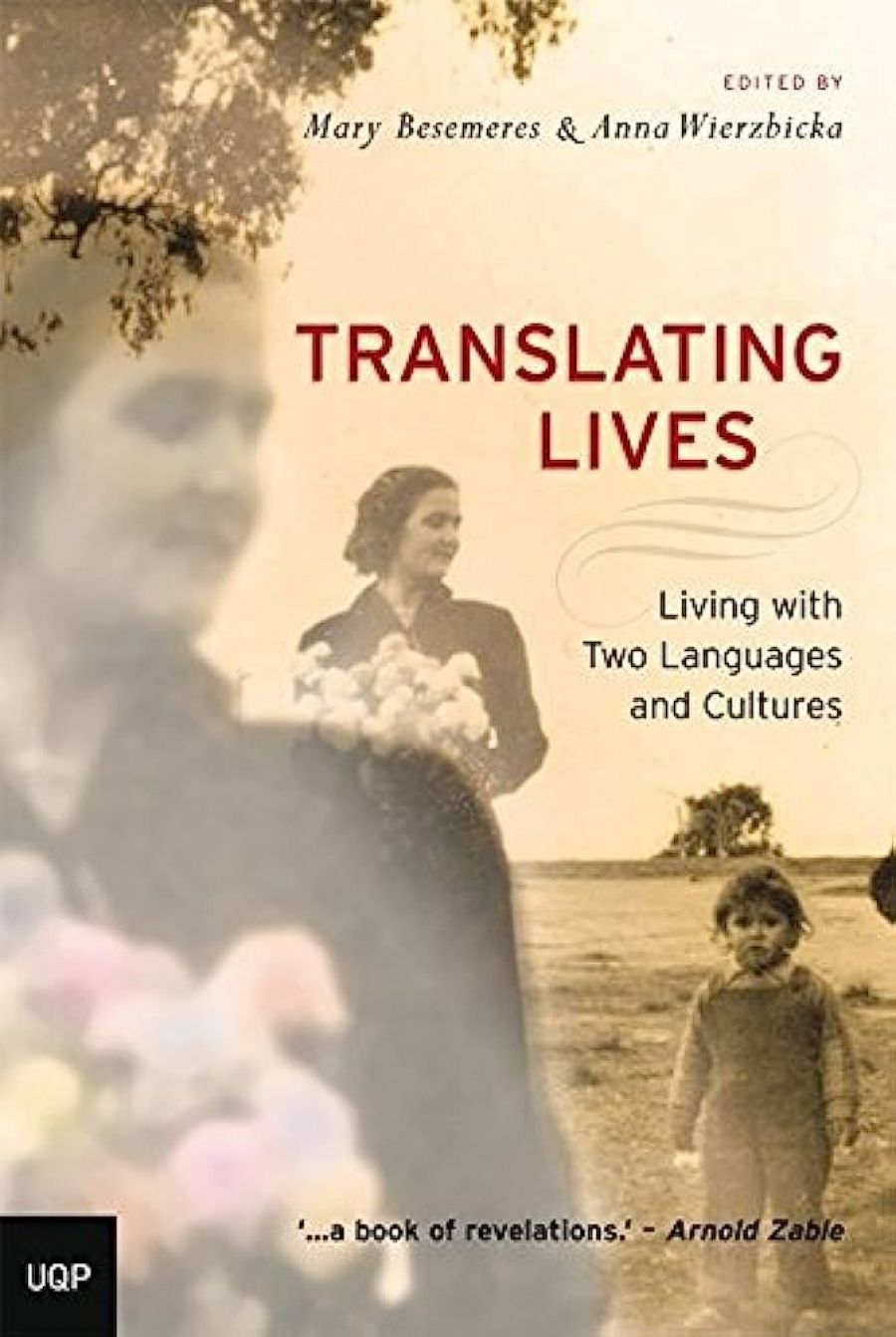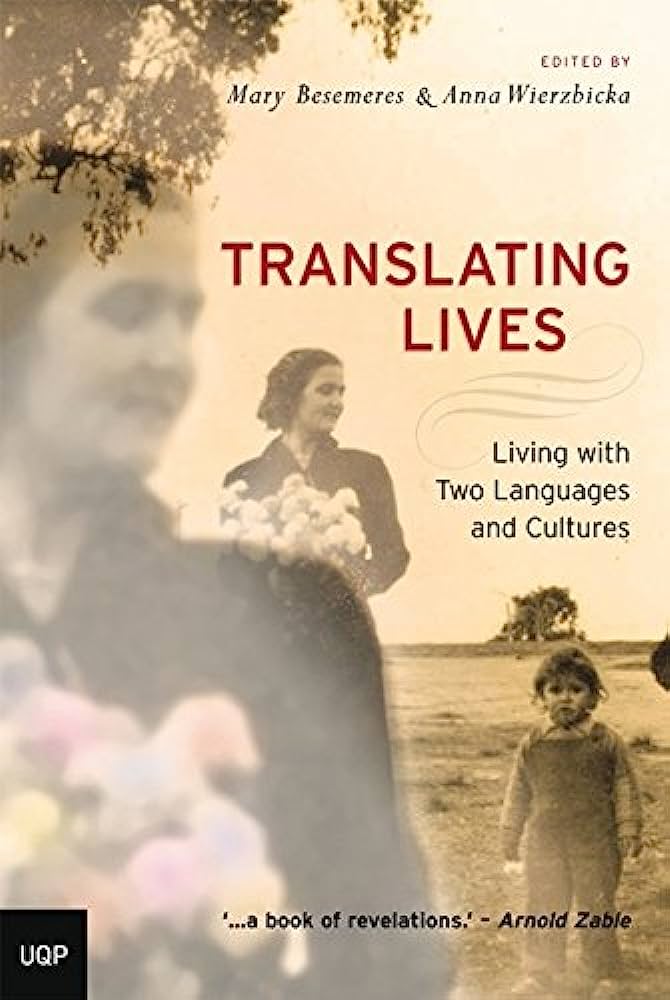
- Free Article: No
- Contents Category: Language
- Review Article: Yes
- Article Title: Dual Identities
- Online Only: No
- Custom Highlight Text:
Language shapes identity: everyone knows that, in theory. Anyone who has studied a foreign language knows that exact equivalents do not exist for every word. Translation cannot be perfect: something is always lost. So what happens when people, used to one linguistic identity, have to translate themselves into a new language? Mary Besemeres and Anna Wierzbicka have assembled twelve witnesses to give personal accounts. All are academics or writers who possess the intellectual resources to make sense of what they have encountered, while at the same time registering the dislocations they have experienced. All write English fluently: they are not concerned with the difficulties of learning English but of being themselves in Australian English. Some make the comment that they are perfectly comfortable writing academic English while still finding the small transactions of daily life a challenge.
- Book 1 Title: Translating Lives
- Book 1 Subtitle: Living with two languages and cultures
- Book 1 Biblio: UQP, $34.95 pb, 181 pp
- Book 1 Cover Small (400 x 600):

- Book 1 Cover (800 x 1200):

It is natural for people unfamiliar with a culture to see it as homogenous. Nevertheless, some of the ways that are foreign to Chinese migrants such as Zhengdao (Veronica) Ye seem just as alien to me:
Any intimate behaviour in public would make me extremely uncomfortable. Any expression of emotion should be controlled and subtle. Chinese couples do not say ‘I love you’ to each other, as people in Australia do over the phone, when seeing each other off, and before going to work. We do not place so much emphasis on verbal expressions of love and affection, because they can evaporate quickly.
Hear! hear! Ye does not realise that the habit of incontinent verbalisation of emotions is not an Anglo-Australian one but a recently imported American vice. Other Australian habits are more ingrained. Kyung-Joo Yoon came to Australia from Korea at the age of thirty:
I had the impression that people competed with each other in apologising and thanking. To me, the strangest thing was that people used the same expressions even within their immediate family circle … when I went to the house of a friend … a five-year-old boy said ‘thank you’ to his mother when she gave him a drink. I remember feeling quite awkward about the way the boy thanked her for such a small favour … The relationship between parents and children is beyond the level of that kind of thanking exchange.
Jock Wong, who arrived in Australia from Hong Kong as an undergraduate, explains that within the Cantonese context … politeness … could be seen as a distancing device … Even the use of common, everyday expressions like ‘please’, ‘thank you’, ‘sorry’, and requests made in the form of a question often seem to me a step backward in the process of bonding with an Anglo person. Such polite expressions often stop a Chinese from seeing the addressee as a close friend.
Even this is not an unfamiliar idea: I have had difficulty explaining to a South African friend that saying ‘please’ can be insulting. Anna Gladkova, a Russian who thought she knew English well, soon realised that ‘successful communication entails much more than using the right grammar and vocabulary’. She had to ‘tone down my manner of expression … In Russian it is good to show one’s emotional involvement in everything one does.’ The idea of personal autonomy, she says, ‘does not exist in Russian’, and it was difficult for her to learn the boundaries which Australians assume:
The friendly interaction style that seemed to characterise Australian culture made me assume that ‘formalities’ were no longer required. When wanting to show my closeness and appreciation of a person I would start dropping the unnecessary (at least for me then) English ‘politeness’ terms of ‘would you’ and ‘could you’ and use a straight imperative and then realise that it was inappropriate.
However, living in Canberra among other postgraduate students has given her a ‘double identity’, and she is amused to find herself disapproving of Indian friends who fail to comply with Australian norms, even though their behaviour is similar to Russian customs.
Wierzbicka sees the fact that Australians tend to dislike issuing orders, and that they prefer suggestions to direct requests, as part of the ‘Anglo cultural script’, because our hierarchy of values is different from the Polish one
Speaking one’s mind is recognised as a value in both cultures. In ‘Anglo English’, however, this value is expected to be balanced against other values … In Polish culture, on the other hand, speaking the truth (as one sees it), and saying what one really thinks and feels has a higher position in the hierarchy of values … The focus is not on protecting the addressee’s feelings, but rather on truthfully expressing one’s own … Polish language has no equivalent of the English expression ‘white lies’.
Irene Ulman, a Russian who came to Australia at the age of twelve after two years in Israel, found Australian playgrounds very difficult places:
In Australia, I was suddenly confronted with what felt to me like a very confusing lack of transparency. Subtext emerged as the new form of communication. Things said were not necessarily things meant … People said I was ‘different’ and they also said I was ‘interesting’ … I hated being different and I especially hated being interesting.
After a while, the constant use of the word ‘Anglo’ began to feel insulting. We learn that the English language seems cold and incapable of expressing feelings towards small children and close friends, and that Australians in general appear insincere, lacking in passion and preoccupied with their own individuality. But some admit that ‘Anglo’ culture is not all bad. Jock Wong values the fact that ‘people allowed me to do what I wanted without any need to conform to any social standards’.
Most have found that bilingualism enhances their lives; as Michael Clyne says, they ‘need at least two languages’ to be themselves. Nevertheless, each essay in this book shows that some loss of self always accompanies translation. Perhaps Kim Scott’s account is the most poignant. Everyone else is concerned with a language that is still flourishing somewhere in the world, even though it may be difficult for some to reconnect. Scott’s ancestral language is Noongar, but he was only able to learn it, as an adult, through considerable determination:
And there is the shame which, unbidden, wrongly insinuates itself ... Some of us want to just know it, not have to consciously learn it. For some, it’s a constant reminder of how tenuous is an Indigenous identity without a language – other than the discourse of politics – with which to affirm it.
Eva Sallis, too, learned her ‘foster mother tongue’ of Arabic as an adult, finding that she has ‘subtly different opinions and understanding of humour’ in the different languages, enjoying the ‘shadows’ that each language casts upon the other.
Many parents, aware of the benefits of bilingualism, are bringing their children up knowing two languages. Yoon observes her son manipulating the different codes embedded in Korean and English: he uses Korean when he needs to show respect to his older brother, while English makes him an equal. Michael Clyne’s daughter has been brought up to speak English to her mother and German to him, and she can punish him by addressing him in English. Mary Besemeres, with a Polish mother and an Australian father, has lived in Australia since she was a baby. Brought up bilingual, she now finds that she enjoys speaking Russian with her mother: it can keep angry Polish arguments at bay.
All these essays are full of the kind of information that both tickles the intellect and touches the heart – two concepts which are indistinguishable, we learn, in Korean. If much of the book sounds like complaint, that only emphasises the need for two-way understanding that extends beyond enjoying each other’s ‘folk dances, costumes and culinary traditions’.


Comments powered by CComment